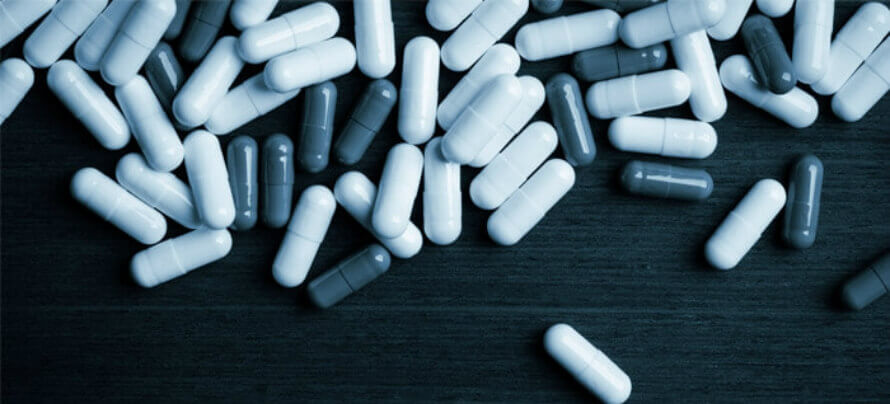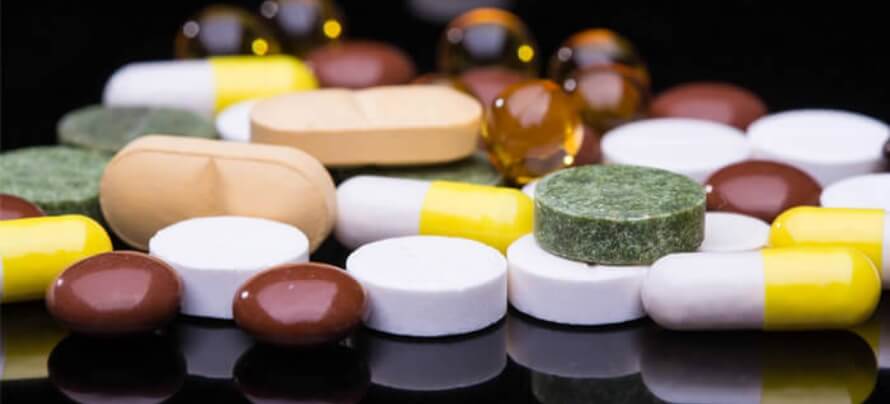Key Takeaways
- Some dietary supplements are used not just to enhance memory and cognition but, specifically, to increase focus and attention so you can work and study better.
- These supplements work in many different ways, and if you don’t naturally have good focus then they can be incredibly helpful for learning.
- L-tyrosine, CDP-choline, and caffeine are three examples of effective focus enhancers that can all be used together because they work in different ways.
If you’re like me you probably have about an hour of “fog time” each work day.
This “fog time” is what I refer to when you’re researching, learning, or processing information and you simply stop for a bit and stare or fidget with something. It’s required, in certain amounts, to properly process and learn new information after all.
If you’re like some of my friends, however, you may scoff at the above; “just one hour? Hah, You gotta pump those numbers up. Those are rookie numbers.”
…yup. Apparently some people spend over half their “work” days not working, and not really by choice.
Such is the problem of having impaired attention, focus, and concentration (and perhaps discipline but we can’t supplement for that, yet.)
For as long as we exist we interact, and for as long as we interact we have multiple choices as to what to interact with. Ideally we would interact with what we want to, without effort, in an attempt to improve our lives.
The unfortunate truth is sometimes the brain decides that it just doesn’t want to do that right now and subtly causes your attention to drift, wander, and focus on things you really shouldn’t.
Can’t really blame little of brainy after all; it’s wondering why we’re not in the plains of Africa, why the lion-like sound is a metal machine we’re getting into to go to work and, when we get there, why we stare into toned down mini-suns for eight hours.
But times change and sometimes you need to adopt new habits, techniques, and maybe even dietary or supplemental techniques to best handle your environment. I can only speak on the last bit so, let’s do that.
- What Is Focus?
- What Are Focus Enhancers?
- The Best 3 Focus Enhancing Supplements
- The Worst Focus Enhancing Supplement
- The Bottom Line on Focus Enhancers
Table of Contents
+Want to listen to more stuff like this? Check out my podcast!
What Is Focus?

Focus, attention, and concentration refer to the ability to perceive something and keep your attention on it without distraction.
We exist and we have senses, so we can interact with things with all of our senses. Some of this information is vital, like hearing whether or not your infant son is crying, while some is best filtered out and ignored, like if your teenage son is crying at a video game cause he sucks.
The ability to perceive a lot of things, able to identify which are good, bad, or unimportant, filter out the unimportant, and then change gears from one important thing to the next when needed is a sign of good and healthy focus.
However, it’s possible to have bad focus including:
- You simply cannot focus on a single target for long periods of time before your mind wanders (although a simplification, this underlies ADD/ADHD.)
- You go “all in” on a task and are unable to switch to other important issues effectively.
- You can focus and switch tasks normally but you hit “a wall” and suddenly cannot focus on things at all for a while (this one is normal but some people are more sensitive to it.)
In these situations, focus-enhancing supplements are usually sought out since people want to improve their productivity.
What Are Focus Enhancers?
Focus enhancing supplements can be anything that helps you focus on a task.
I know that sounded incredibly basic but that’s really it, and it’s a lot broader of a topic than you would think. I mean, amphetamines increase focus and attention processing when given to people with ADHD despite the fact that they could totally screw other people up.
Practically speaking, people who can’t focus can’t focus for some reason and whatever targets that reason can be argued to be a focus enhancer. The problem is, there are a lot of reasons and a lot of potential focus enhancers. This includes uppers (stimulants) as well as downers (depressants) given the context of use.
If you’re the type of person to spring out of bed and run laps before work then caffeine probably isn’t going to help you as much as a mild sedative could. If you’re the opposite and your brain fog forms a comfy blanket for most of the day, then taking a sedative before work would just be shooting yourself in the foot (with a tranquilizer dart.)
There are also a few options for people who fall into neither of those above categories. I’ll go over all of them below.
The Best 3 Focus Enhancing Supplements
To preface this section, I will not be covering any pharmaceutical options nor will I be covering amphetamines or amphetamine analogues (which are used in ADD/ADHD.) Just legal options you can get over the counter in stores and online.
L-DOPA/L-Tyrosine

The main options for increasing focus would be L-tyrosine and L-DOPA.
These supplements are two separate but related precursors to dopamine, norepinephrine, and epinephrine that are related to focus and attention. L-tyrosine is the “safer” and more gentle option while L-DOPA is more likely to “force” effects both beneficial and hazardous.
I’m covering them both in this section since they’re related but, remember, two different molecules.
As written in my definitive guide, L-tyrosine doesn’t necessarily increase focus outright but rather provides a buffer of L-tyrosine for when you use up these neurotransmitters. Eventually, during cognitive testing, you’ll start to “lose” focus and this is delayed with L-tyrosine at 2 grams in your body.
It shines mostly in task switching (i.e. cognitive flexibility) by helping your brain stop doing task A so you can switch to task B.
L-DOPA (also known as Levodopa) is the molecule that L-tyrosine turns into—the intermediate before it turns directly into dopamine. The major difference, however, is that the conversion of L-tyrosine to L-DOPA (by the enzyme tyrosine hydroxylase) is rate limiting so while L-tyrosine levels are tightly controlled L-DOPA is not.
So theoretically L-DOPA should be better able to increase dopamine and thereby improve attention.
Human studies on the topic have found that 300 mg L-DOPA supplementation have failed to improve attention and elsewhere failed to influence sensory gating (the ability of the brain to filter out useless information to better focus on the important stuff.)
It may have been that specific test though, since another study using L-DOPA found improved semantic processing (the ability to connect the context of words to other words); not directly related to attention, mind you, but don’t want to give the impression that L-DOPA is ineffective overall.
Surprisingly, that’s all the data we have on L-DOPA and attention processing in healthy subjects. Most research is conducted in persons with Parkinson’s disease where L-DOPA, paired with carbidopa, is the basic pharmaceutical intervention.
L-tyrosine appears to be effective in sustaining focus, and helping you cognitively switch between tasks, at the dose of 2 grams a day. It may not increase focus outright, however, since it mostly prolongs how long it takes to lose focus.
L-DOPA, surprisingly, doesn’t have much evidence at this point in time for improving attention and focus at the tested dose of 300 mg (a reasonable dose.)
Caffeine
Caffeine is the prototypical stimulant for dietary supplements.
It works in a fairly simple manner. It blocks adenosine receptors. If adenosine is allowed to act it will cause sedation but, by blocking the receptors and preventing adenosine from acting, wakefulness results from caffeine ingestion.
At least in the short term it can also increase dopamine signaling, so tapping into a lot of the pathways mentioned in the preceding section, but this is something that goes away when you become tolerant to caffeine (the moment it goes from stimulant to a mere pick-me-up.)
Caffeine usually increases general arousal (awareness to stimuli), vigilance, and reaction time, all parameters somewhat related to attention, and studies focusing on attention specifically find benefits with doses as low as 60 mg.
Surprisingly, despite caffeine only having dopamine-promoting effects when you are not tolerant to caffeine, there is evidence that even if you are tolerant to caffeine there are still benefits to attention associated with your “morning fix” of caffeine.
So it seems the benefits of attention, while they could partially be explained by the dopamine effects of caffeine as a stimulant, are mostly explained by the adenosine mechanisms. This means that daily caffeine consumption is totally okay for attention and you wouldn’t need to cycle it for this purpose.
Caffeine, secondary to increasing wakefulness by blocking adenosine signaling, can cause a variety of cognitive benefits that are all related to improved attention, focus, and concentration. Daily usage of caffeine seems to work and it doesn’t need to be cycled.
CDP-Choline

CDP-choline (Cytidine-5’-diphosphocholine) is a supplement that combines the two nootropic compounds choline, which produces acetylcholine, and cytidine, which turns into uridine (the diphospho- is just needed to make the combination chemically stable).
It’s one of two choline supplements commonly used for brain-related reasons, the other being Alpha-GPC. CDP-choline, however, has more human research on it and usually this research pertains to focus and attention.
It does seem to influence acetylcholine signaling and these properties underlie how CDP-choline can improve processing speed, memory, and executive function (250 to 500 mg outperformed 1,000 mg) with one study suggesting that the improvement in sensory gating is also due to this function (also a reason why it is investigated for schizophrenia research.)
These cholinergic properties may also be why it improves memory and verbal memory in elderly subjects.
Ultimately, CDP-choline has some evidence for improving attention (by helping sensory gating) but it isn’t something that has 100% reliability in working. It seems to work better the more impaired or damaged your brain is so:
- If you are middle-aged or elderly
- If you have subpar processing speed, memory, or executive function (i.e. low IQ)
- If you have bad sensory gating and get easily distracted by irrelevant information
Then CDP-choline becomes a very interesting dietary supplement to be taken between 250 to 500 mg a day, with more CDP-choline not outperforming the lower doses. It has even been tested alongside caffeine to see if there is synergism.
CDP-choline is a potential focus enhancer that also has properties of memory enhancement, but it’s possible that it either only works minorly or works potently in those with otherwise impaired attention, focus, and executive function.
Honorable Mentions
We only have one honorable mention this time around but, given how it was a pivotal molecule for the making of Pulse, specifically in how it influences attention and focus, it has to be here:
L-Theanine
L-theanine, by itself, does not have much evidence to suggest it can increase focus all that potently. However, it has a unique set of studies where it’s used alongside caffeine.
The way the combination works is pretty cool, actually. Basically the combination of the two is synergistic for increasing focus and sustaining it despite the fact that the two are literally the opposite when it comes to emotional arousal—since they negate each other on emotional arousal it prevents the mind from wandering.
Think of it this way. Caffeine increases attention by increasing arousal, but that means you pay better attention to everything, so people find themselves paying attention to things they don’t want to when they take caffeine.
L-theanine helps curtail some of that excessive arousal without decreasing the focus-enhancing effects of caffeine, thus giving you the good without the bad. This is one of the main reasons Pulse contains L-theanine—it helps mellow out the harsh effects of caffeine.
There is currently no major evidence to show that L-theanine works by itself, with all human evidence being on the combination of caffeine and L-theanine, but it is possible that L-theanine could work alone. Would mostly be for people who are too emotionally antsy to calm down and focus though.
Furthermore, L-theanine has not been tested with other stimulants so we have no clue if L-theanine works nicely with something like yohimbine.
L-theanine is perfect option for those who easily get their heads in the clouds when trying to study, and excellent when paired with caffeine.
Since L-theanine is able to impede caffeine’s ability to increase emotional arousal it can, practically speaking, refine the focus enhancement from caffeine and turn a general improvement of attention into a more selective one. Overall a highly synergistic combination.
The Worst Focus Enhancing Supplement

“Racetam” refers to a group of drugs that, while technically all synthetic, are still commonly seen in circles online and in various nootropic groups. The namesake “racetam”, piracetam, is actually the molecule that started the nootropic movement after all.
The first collection of these molecules, known as piracetam, aniracetam, and oxiracetam, were all similar as they worked on a target in the brain known as AMPA (a glutamate receptor important to memory formation) and, of course, they all looked the same; they were all racetams after all.
However, since then, the only commonality between racetams is their structure being a “racetam.” Nowadays they can differ widely from one another in how they function, the level of evidence, and even their safety.
Piracetam is heralded as safe, which makes sense since, after 3,500 studies on it and some meta-analyses, there hasn’t really been much reason to call it dangerous and it’s even been used in babies safely. Options like phenylpiracetam have side-effects associated with potent stimulants (due to it influencing dopamine) while nefiracetam may damage testicles.
Racetams have also gotten a lot of notoriety with a subculture of “bio-hackers” who credit every single beneficial property under the sun to them.
At this moment in time there is no human evidence, for any racetam, in improving attention and focus in otherwise healthy adults. A surprising lack of human evidence overall for these bad boys but, alas, let’s just focus on the attention one so we don’t need to delve too much further into the topic.
(This may not apply to phenylpiracetam since I mentioned that it does have stimulant-like properties but I’m not about to recommend a less than optimally researched and technically not legal stimulant drug to y’all.)
The group of molecules known as the “racetams” are typically associated with almost every beneficial cognitive effect, with most of it being either hype or theory. At this moment in time they are not viable focus and attention supplements.
The Bottom Line on Focus Enhancers
At the end of the day the best way to supplement for improved focus is to first determine why you lose focus. Nobody is perfect but we’re all messed up in different ways and, if you can find out specifically how you are messed up, you can target it better.
However, a basic stack of…
- 2 grams of L-tyrosine
- 250 mg of CDP-choline
- A decent caffeine source (perhaps a cup of coffee)
… would be a good, generalized, starting point until you figure out and target the issue further.
And of course, if you want to take something to improve your brain health on the whole then I recommend Ascend, which has CDP-choline and some other memory-enhancing goodies, or if you don’t mind beta-alanine tingles then Pulse is a tasty way of getting the caffeine and L-theanine combination.
What’s your take on the best and worst supplements for improving focus? Have anything else to share? Let me know in the comments below!
Scientific References +
- Shimada, M., Shikanai, Y., Shimomura, K., Harada, S., Watanabe, G., Taya, K., Kato, M., & Furuhama, K. (2003). Investigation of testicular toxicity of nefiracetam, a neurotransmission enhancer, in rats. Toxicology Letters, 143(3), 307–315. https://doi.org/10.1016/S0378-4274(03)00197-8
- Zvejniece, L., Svalbe, B., Vavers, E., Makrecka-Kuka, M., Makarova, E., Liepins, V., Kalvinsh, I., Liepinsh, E., & Dambrova, M. (2017). S-phenylpiracetam, a selective DAT inhibitor, reduces body weight gain without influencing locomotor activity. Pharmacology Biochemistry and Behavior, 160, 21–29. https://doi.org/10.1016/j.pbb.2017.07.009
- Zhang, J., Wei, R., Chen, Z., & Luo, B. (2016). Piracetam for Aphasia in Post-stroke Patients: A Systematic Review and Meta-analysis of Randomized Controlled Trials. In CNS Drugs (Vol. 30, Issue 7, pp. 575–587). Springer International Publishing. https://doi.org/10.1007/s40263-016-0348-1
- Al Hajeri, A., & Fedorowicz, Z. (2016). Piracetam for reducing the incidence of painful sickle cell disease crises. In Cochrane Database of Systematic Reviews (Vol. 2016, Issue 2). John Wiley and Sons Ltd. https://doi.org/10.1002/14651858.CD006111.pub3
- Jung, H. Y., Kim, D. W., Nam, S. M., Kim, J. W., Chung, J. Y., Won, M. H., Seong, J. K., Yoon, Y. S., Yoo, D. Y., & Hwang, I. K. (2017). Pyridoxine improves hippocampal cognitive function via increases of serotonin turnover and tyrosine hydroxylase, and its association with CB1 cannabinoid receptor-interacting protein and the CB1 cannabinoid receptor pathway. Biochimica et Biophysica Acta - General Subjects, 1861(12), 3142–3153. https://doi.org/10.1016/j.bbagen.2017.09.006
- Mappouras, D. G., Stiakakis, J., & Fragoulis, E. G. (1990). Purification and characterization of L-DOPA decarboxylase from human kidney. Molecular and Cellular Biochemistry, 94(2), 147–156. https://doi.org/10.1007/BF00214121
- Kahathuduwa, C. N., Dhanasekara, C. S., Chin, S. H., Davis, T., Weerasinghe, V. S., Dassanayake, T. L., & Binks, M. (2018). L-Theanine and caffeine improve target-specific attention to visual stimuli by decreasing mind wandering: a human functional magnetic resonance imaging study. Nutrition Research, 49, 67–78. https://doi.org/10.1016/j.nutres.2017.11.002
- Giles, G. E., Mahoney, C. R., Brunyé, T. T., Taylor, H. A., & Kanarek, R. B. (2017). Caffeine and theanine exert opposite effects on attention under emotional arousal. Canadian Journal of Physiology and Pharmacology, 95(1), 93–100. https://doi.org/10.1139/cjpp-2016-0498
- Foxe, J. J., Morie, K. P., Laud, P. J., Rowson, M. J., De Bruin, E. A., & Kelly, S. P. (2012). Assessing the effects of caffeine and theanine on the maintenance of vigilance during a sustained attention task. Neuropharmacology, 62(7), 2320–2327. https://doi.org/10.1016/j.neuropharm.2012.01.020
- Haskell, C. F., Kennedy, D. O., Milne, A. L., Wesnes, K. A., & Scholey, A. B. (2008). The effects of l-theanine, caffeine and their combination on cognition and mood. Biological Psychology, 77(2), 113–122. https://doi.org/10.1016/j.biopsycho.2007.09.008
- Bruce, S. E., Werner, K. B., Preston, B. F., & Baker, L. M. (2014). Improvements in concentration, working memory and sustained attention following consumption of a natural citicoline-caffeine beverage. International Journal of Food Sciences and Nutrition, 65(8), 1003–1007. https://doi.org/10.3109/09637486.2014.940286
- Spiers, P. A., Myers, D., Hochanadel, G. S., Lieberman, H. R., & Wurtman, R. J. (1996). Citicoline improves verbal memory in aging. Archives of Neurology, 53(5), 441–448. https://doi.org/10.1001/archneur.1996.00550050071026
- Gruber, S. A. (2015). Citicoline Treatment Improves Measures of Impulsivity and Task Performance in Chronic Marijuana Smokers: A Pilot BOLD fMRI Study. International Journal of Neurology and Neurotherapy, 2(2). https://doi.org/10.23937/2378-3001/2/2/1032
- Aidelbaum, R., Labelle, A., Baddeley, A., & Knott, V. (2018). Assessing the acute effects of CDP-choline on sensory gating in schizophrenia: A pilot study. Journal of Psychopharmacology, 32(5), 541–551. https://doi.org/10.1177/0269881117746903
- Knott, V., Smith, D., De La Salle, S., Impey, D., Choueiry, J., Beaudry, E., Smith, M., Saghir, S., Ilivitsky, V., & Labelle, A. (2014). CDP-choline: Effects of the procholine supplement on sensory gating and executive function in healthy volunteers stratified for low, medium and high P50 suppression. Journal of Psychopharmacology, 28(12), 1095–1108. https://doi.org/10.1177/0269881114553254
- Knott, V., De La Salle, S., Choueiry, J., Impey, D., Smith, D., Smith, M., Beaudry, E., Saghir, S., Ilivitsky, V., & Labelle, A. (2015). Neurocognitive effects of acute choline supplementation in low, medium and high performer healthy volunteers. Pharmacology Biochemistry and Behavior, 131, 119–129. https://doi.org/10.1016/j.pbb.2015.02.004
- Knott, V., Salle, S. de la, Smith, D., Choueiry, J., Impey, D., Smith, M., Beaudry, E., Saghir, S., Ilivitsky, V., & Labelle, A. (2015). Effects of acute CDP-choline treatment on resting state brain oscillations in healthy volunteers. Neuroscience Letters, 591, 121–125. https://doi.org/10.1016/j.neulet.2015.02.032
- Lanini, J., Galdurõz, J. C. F., & Pompéia, S. (2016). Acute personalized habitual caffeine doses improve attention and have selective effects when considering the fractionation of executive functions. Human Psychopharmacology, 31(1), 29–43. https://doi.org/10.1002/hup.2511
- Wilhelmus, M. M. M., Hay, J. L., Zuiker, R. G. J. A., Okkerse, P., Perdrieu, C., Sauser, J., Beaumont, M., Schmitt, J., Van Gerven, J. M. A., & Silber, B. Y. (2017). Effects of a single, oral 60 mg caffeine dose on attention in healthy adult subjects. Journal of Psychopharmacology, 31(2), 222–232. https://doi.org/10.1177/0269881116668593
- Kahathuduwa, C. N., Dassanayake, T. L., Amarakoon, A. M. T., & Weerasinghe, V. S. (2017). Acute effects of theanine, caffeine and theanine–caffeine combination on attention. Nutritional Neuroscience, 20(6), 369–377. https://doi.org/10.1080/1028415X.2016.1144845
- Kamimori, G. H., McLellan, T. M., Tate, C. M., Voss, D. M., Niro, P., & Lieberman, H. R. (2015). Caffeine improves reaction time, vigilance and logical reasoning during extended periods with restricted opportunities for sleep. Psychopharmacology, 232(12), 2031–2042. https://doi.org/10.1007/s00213-014-3834-5
- Giles, G. E., Mahoney, C. R., Brunyé, T. T., Taylor, H. A., & Kanarek, R. B. (2017). Caffeine and theanine exert opposite effects on attention under emotional arousal. Canadian Journal of Physiology and Pharmacology, 95(1), 93–100. https://doi.org/10.1139/cjpp-2016-0498
- Copland, D. A., McMahon, K. L., Silburn, P. A., & De Zubicaray, G. I. (2009). Dopaminergic neuromodulation of semantic processing: A 4-T fMRI study with levodopa. Cerebral Cortex, 19(11), 2651–2658. https://doi.org/10.1093/cercor/bhp017
- Oranje, B., Gispen-De Wied, C. C., Westenberg, H. G. M., Kemner, C., Verbaten, M. N., & Kahn, R. S. (2004). Increasing dopaminergic activity: Effects of L-dopa and bromocriptine on human sensory gating. Journal of Psychopharmacology, 18(3), 388–394. https://doi.org/10.1177/026988110401800310
- Oranje, B., Gispen-De Wied, C. C., Westenberg, H. G. M., Kemner, C., Verbaten, M. N., & Kahn, R. S. (2006). No effects of l-dopa and bromocriptine on psychophysiological parameters of human selective attention. Journal of Psychopharmacology, 20(6), 789–798. https://doi.org/10.1177/0269881106061712
- Nakashima, A., Hayashi, N., Kaneko, Y. S., Mori, K., Sabban, E. L., Nagatsu, T., & Ota, A. (2009). Role of N-terminus of tyrosine hydroxylase in the biosynthesis of catecholamines. In Journal of Neural Transmission (Vol. 116, Issue 11, pp. 1355–1362). J Neural Transm (Vienna). https://doi.org/10.1007/s00702-009-0227-8
- Steenbergen, L., Sellaro, R., Hommel, B., & Colzato, L. S. (2015). Tyrosine promotes cognitive flexibility: Evidence from proactive vs. reactive control during task switching performance. Neuropsychologia, 69, 50–55. https://doi.org/10.1016/j.neuropsychologia.2015.01.022
- Colzato, L. S., Jongkees, B. J., Sellaro, R., van den Wildenberg, W. P. M., & Hommel, B. (2014). Eating to stop: Tyrosine supplementation enhances inhibitory control but not response execution. Neuropsychologia, 62, 398–402. https://doi.org/10.1016/j.neuropsychologia.2013.12.027
- Padilha, S. C. O. S., Virtuoso, S., Tonin, F. S., Borba, H. H. L., & Pontarolo, R. (2018). Efficacy and safety of drugs for attention deficit hyperactivity disorder in children and adolescents: a network meta-analysis. European Child and Adolescent Psychiatry, 27(10), 1335–1345. https://doi.org/10.1007/s00787-018-1125-0










